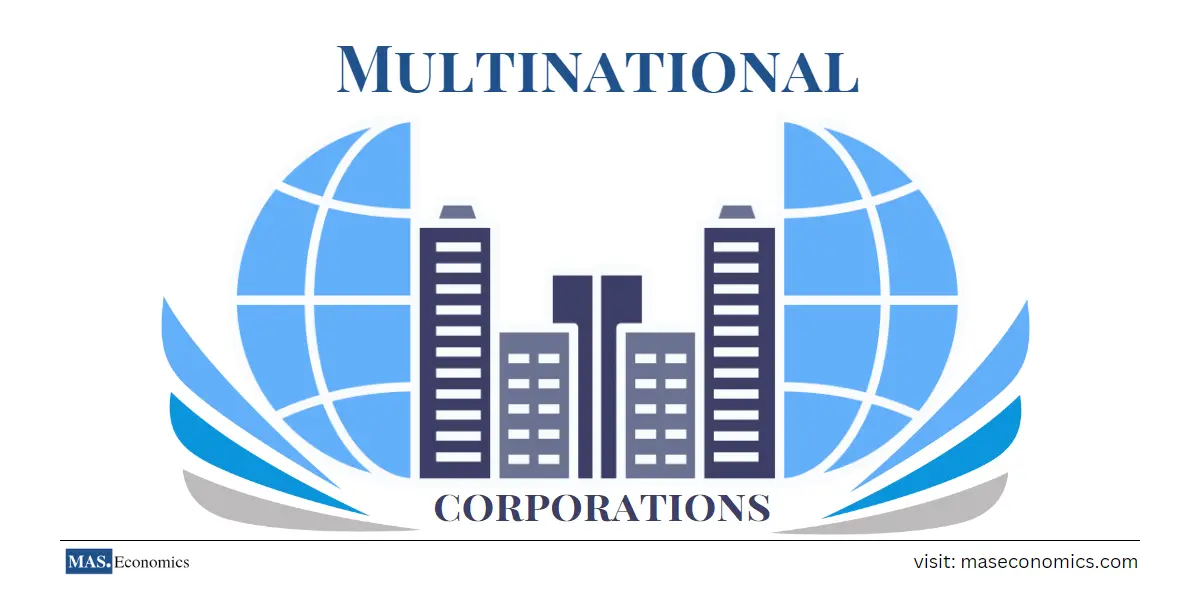Multinational corporations (MNCs) operate in multiple countries, with a significant presence beyond their home nation. These global entities have become increasingly influential in shaping the global economy, impacting international trade, job creation, and economic development. According to the World Investment Report 2023 by UNCTAD, MNCs’ foreign direct investment (FDI) reached a record high of $1.3 trillion in 2023, highlighting their significant role in global capital flows.
Types of Multinational Corporations
Horizontal MNCs
These companies produce the same goods or services in multiple countries. For example, fast-food chains like McDonald’s and KFC operate restaurants globally, offering similar menus with slight variations to cater to local tastes.
Vertical MNCs
These firms operate in different stages of production in various countries. For instance, a clothing company may source raw materials like cotton from India, manufacture garments in Vietnam, and sell them in the United States.
Conglomerate MNCs
These corporations have diversified operations across multiple industries and countries. General Electric, for example, has businesses ranging from aviation and healthcare to energy and finance, with a presence in over 180 countries.
Global MNCs
These companies have a centralized management structure but operate in numerous countries. Apple, for instance, designs its products in California but manufactures them through contractors in countries like China and Taiwan.
Transnational MNCs
These firms combine global coordination with local responsiveness. They adapt their products and strategies to suit individual markets while maintaining a unified corporate identity. Nestlé is a prime example, with a wide range of localized products tailored to different regions, like Nescafé coffee and Maggi instant noodles.
Advantages and Disadvantages of MNCs
| Advantages | Disadvantages |
|---|---|
| Economic Growth and Development (FDI, Job Creation, Technology Transfer) |
Exploitation of Labor and Resources (Low Wages, Environmental Damage) |
| International Trade and Innovation (Efficiency, Technological Advancements) |
Threat to Small Businesses (Competition) |
| Access to a Wider Market (New Customers Globally) |
Cultural Homogenization (Loss of Local Culture) |

|
|
Impact of MNCs on the Global Economy:
Economic Growth and Development
MNCs contribute to economic growth in host countries through foreign direct investment, job creation, and infrastructure development. They often bring advanced technologies, management practices, and skills that can spill over to local firms, boosting productivity and competitiveness. For example, a 2022 study by the International Labour Organization (ILO) found that MNCs create an average of five new jobs for every job they directly employ in developing countries.
International Trade and Innovation
MNCs are critical drivers of international trade, accounting for a significant share of global exports and imports. They help integrate countries into global value chains, fostering specialization and efficiency in production processes. MNCs also spur innovation by investing in research and development (R&D) and promoting knowledge transfer across borders. For instance, pharmaceutical giants like Pfizer and Novartis conduct R&D in multiple countries to develop new drugs and therapies, accelerating advancements in healthcare.
Social and Environmental Impact
While MNCs can contribute to economic growth, they face criticism for their social and environmental impact. Some MNCs have been accused of exploiting low-wage workers, violating labor rights, and damaging the environment in developing countries. However, many MNCs are now adopting corporate social responsibility (CSR) practices to address these concerns. For example, Unilever has committed to sustainably sourcing 100% of its agricultural raw materials by 2023, aiming to reduce its environmental footprint.
Case Studies
- Volkswagen (VW): VW is a German automaker with production facilities in over 20 countries. While it faced controversies like the 2015 emissions scandal, VW has also invested heavily in electric vehicles and sustainable mobility solutions, aiming to reduce its carbon footprint.
- Coca-Cola: This beverage giant operates in over 200 countries and adapts its products to local preferences. Coca-Cola has been criticized for its water usage and contribution to plastic waste. Still, it has set goals to reduce its environmental footprint and support community development projects, such as rainwater harvesting initiatives in India.
- HSBC: As one of the world’s largest banking and financial services organizations, HSBC operates in 62 countries. Although it has faced money laundering allegations, it has strengthened its compliance measures and invested in financial inclusion initiatives, providing access to banking services for underserved communities.
t their efforts to promote sustainability and social responsibility. This can help build trust and confidence in the company and demonstrate a commitment to responsible and sustainable operation.
Regulation and Corporate Social Responsibility
Governments and international organizations play a crucial role in regulating MNCs to ensure fair competition, protect workers’ rights, and safeguard the environment. The Organisation for Economic Co-operation and Development (OECD) has established guidelines for responsible business conduct, promoting sustainable development and respect for human rights.
MNCs also increasingly embrace CSR to address societal challenges and maintain their social license to operate. Many companies now publish sustainability reports, set emission reduction targets, and engage in community development projects. For example, Microsoft has committed to becoming carbon-negative by 2030 and investing in renewable energy projects worldwide, demonstrating its commitment to environmental responsibility.
The Future of Multinational Corporations:
As the world becomes increasingly interconnected, the role of MNCs is likely to evolve. The rise of digital technologies, such as artificial intelligence (AI) and blockchain, is transforming global business models. MNCs that embrace these technological advancements can gain a competitive edge by:
- Streamlining operations: AI can automate tasks, improve logistics, and optimize resource allocation, increasing efficiency.
- Enhancing customer experiences: MNCs can leverage AI and big data to personalize marketing strategies, provide targeted recommendations, and improve customer service across different regions.
- Driving innovation: Blockchain technology can facilitate secure and transparent transactions, potentially revolutionizing supply chain management and enabling new business models.
Moreover, the growing emphasis on sustainability and corporate social responsibility (CSR) will shape the future of MNCs. Companies that prioritize:
- Environmental stewardship: This can involve reducing carbon emissions, adopting renewable energy sources, and minimizing waste throughout their operations.
- Ethical practices include ensuring fair labor practices, respecting human rights, and upholding ethical sourcing standards across global supply chains.
- Social impact: MNCs can contribute to positive social change by investing in education and healthcare initiatives, supporting local communities, and promoting social inclusion.
Conclusion
Multinational corporations are potent actors in the global economy, shaping trade, investment, and development patterns. While they can drive economic growth and innovation, MNCs are also responsible for operating sustainably and ethically. As the world faces pressing challenges like climate change and inequality, MNCs must work with governments, civil society, and local communities to find solutions that balance business interests with social and environmental imperatives.



